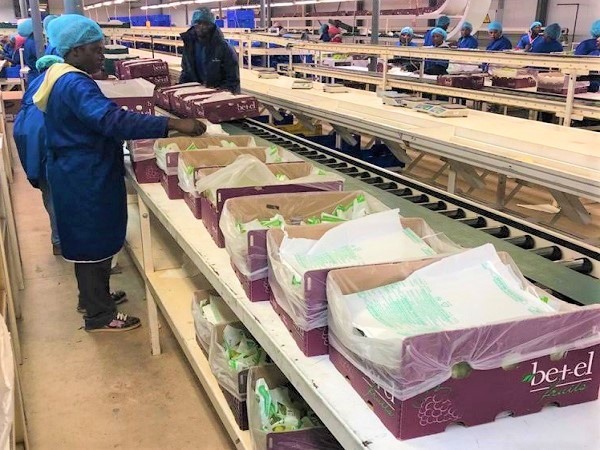The very last grapes of Bet-El's season, Crimson, will arrive this week in Europe, last of the season before the first red seedless from Chile. The red seedless and seeded category – specifically Red Globe – attained consistent prices in Europe that they've not seen before, says Francois Myburgh, marketing executive of Bet-El Fruits.
Last-minute changes from UK to EU
During the season grapes initially meant for the UK, were moved over to mainland Europe (accruing additional re-exporting and repackaging costs) because the pricing offered by the receivers in the UK was just not feasible in the latter.
"The UK is under a lot of pressure. In the past receivers would be able to make plans when the market was full through their alliances on the continent. Now with Brexit you can't simply shift fruit over like in the past. We're seeing the impact as we're closing off the books for the season. While UK supermarkets still take large volumes at decent price levels, wholesale just can't absorb multiple vessels arriving simultaneously and specially not when fruit is has deviations in quality."
Europe has options – a stronger wholesale sector, the whole Eastern bloc, and even handling and storage facilities which feel to him superior to the UK's.
Some of the final vessels bunched up and arrived simultaneously over weeks 11 to 13, dragging down the sales tempo. "Fruit can't sit two or three weeks in a warehouse until the market turns, due to storage and shelf life ability, a result of the late regions being affected by rain throughout."

Frequent rains bedevilled the Hex grape crop
Depending on the region, the South African grape season was very differently experienced: most regions reached estimates and even exceeded, but during harvesting when the sugars are high, the Hex River Valley couldn't go ten days without yet another rain shower.
"Our exposure of the Hex River Valley was very limited. Growers in the Orange River region will tell you they had an excellent grape season, and a company like ours who source mostly from the Northern Cape and Trawal would agree. But someone with over 50% exposure to the later regions, will probably have experienced it as quite a challenging season."
Later regions in general didn't get to their usual excellent quality, he says, with a high strike rate on arrivals. He knows the feeling: this year, Trawal vineyards offered fantastic quality after a challenging 2023 season.
The Hex River Valley, South Africa's last, planted many vineyards with the Far East in mind: desirable new-generation cultivars with large berry sizes. "However, they could not service the Asian market for which they geared themselves because after the rain incidents, fruit couldn't be trusted to withstand the cold protocol to China and didn't have the legs for a long transit period, so that also had an effect on the grape market."
Those were the difficult decisions that needed to be taken this season, he observes. Another region accustomed to working around rain during harvest time (in their case not unexpected) is the Groblersdal-Marble Hall area in Limpopo Province, the very earliest grape production region of the country. Last year growers here had a extremely challenging season due to rain but this year most growers, Myburgh notes, managed to get everything off the vine without too much rain interruption, landing with good quality.
He remarks that the input costs on grapes in this summer rainfall area is becoming burdensome and a significant number of vines have been removed. Fortunately, citrus also flourishes in their climate, and in particular their oranges – nice and firm – are popular among Far and Middle Eastern buyers looking for product with strong shelf life and good cosmetics.
Bet-El Fruits now turns to its citrus exports; ClemenLuz and the very first navels (for the USA and EUROPE) as well as lemons). He observes that the Middle East, the primary market during South Africa's early lemon season, is again under a lot of pressure due to an oversupply, as happens every year. For more information:
For more information:
Francois Myburgh
Bet-El Fruits
Tel: +27 21 863 3146 or +27 21 863 3147
Email: [email protected]
https://betelfruits.com/
